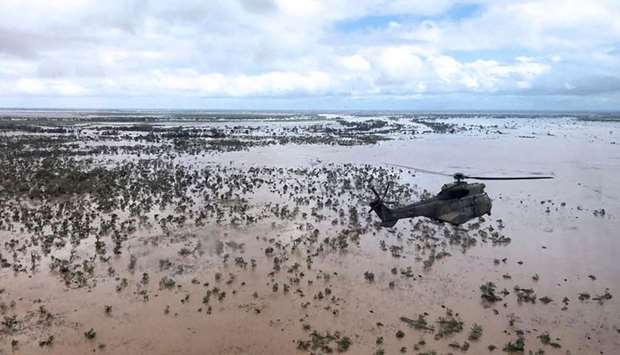Rescuers in cyclone-hit Mozambique are desperately
trying to save people stranded on small islands created by flood
waters, the World Food Programme said on Wednesday, warning that
continuing rains are making the situation worse.
"The rain has continued, the flooding has continued, the rivers have
burst their banks and they've basically created inland islands,"
Gerald Bourke, WFP southern Africa communications officer, told dpa
from the devastated city of Beira.
About 170 people had already been rescued from such islands on
Tuesday and the efforts were continuing, he said.
"A major part of the aid effort at the minute is to rescue them from
the roofs of houses. There are South African helicopters flying to
those areas, bringing them back to Beira airport for medical
attention," he added.
Cyclone Idai, a Category 4 storm, could be one of the biggest cyclone
disasters south of the equator, according to the World Meteorological
Organization (WMO), and has brought devastation to several countries
in the region.
Mozambique's president, Filipe Nyusi, has said there may be as many
as 1,000 fatalities in the southern African nation and has declared a
state of emergency.
The Council of Ministers said in a statement that the "government
will mobilize as many resources as possible to respond to the
crisis," and has also officially appealed for international help.
Mozambique started three days of national mourning on Wednesday, with
flags flying at half-mast, after Nyusi said an estimated 350,000
people had been affected by the storm.
Some 202 bodies have been recovered, according to the council of
ministers.
Meanwhile, Renamo, the main opposition party in Mozambique, slammed
the government's response to the crisis at a press conference, saying
the morgue in the biggest hospital in Beira was full and couldn't
take more corpses.
The cyclone made landfall in Mozambique late on Thursday after
brewing in the Indian Ocean, bringing winds of up to 180 kilometres
per hour before weakening slightly and heading towards Zimbabwe.
Idai created a storm tide of 3.5 to 4 metres that swept Mozambique's
coastal city of Beira, WMO spokeswoman Clare Naden said in Geneva.
In Malawi, more than 900,000 people were affected, with 56 deaths and
577 injuries recorded, according to the UN. Almost 83,000 people are
estimated to be displaced.
In neighbouring Zimbabwe, the storm caused strong winds and heavy
rains, causing flash flooding, which killed more than 100 people.
Over 200 others in Zimbabwe are still reported missing, according to
the UN Office for the Coordination of Humanitarian Affairs (OCHA),
and helicopter rescue operations are under way.
"The police sub-aqua unit has been deployed. Military personnel are
proceeding by foot towards where roads have been destroyed" in
Zimbabwe, OCHA added.
Chimanimani and Chipinge remain the hardest-hit districts in
Zimbabwe, with access still problematic, and "crops and livestock
have been destroyed in both districts, which were already facing
crisis levels of food insecurity."
"There are also growing concerns regarding the potential effects of
the overflow of the Marowanyati Dam in Zimbabwe on water levels in
Mozambique," the organization said.
Many areas of Mozambique remained without power and water on
Wednesday, but after days without, telecommunications have been
restored in Beira, according to Tmcel, the state telecoms company.
The WFP and Red Cross are concerned about water-borne diseases like
cholera and typhoid.
A Red Cross spokeswoman, Hanne Roden, told dpa there are currently 38
accommodation centres in Beira for displaced people, with others
being housed in schools and churches, but mainly tents.
The European Union has pledged almost 4 million dollars in emergency
relief to the countries affected, while the UN Emergency Fund
allocated 20 million dollars.
"These are desperate times," said the WFP's Bourke, adding that more
rain is forecast.
"There are other rivers swelling up, the reservoirs of the dams are
filling up very fast."
In St Peter's Square in the Vatican City, Pope Francis prayed for the
flood victims during his weekly audience.
"Over the past days, serious floods have sowed death and devastation
in several regions of Mozambique, Zimbabwe and Malawi. I express my
pain and solidarity for the beloved people [of these countries]," he
said.
"I entrust the many victims and their families to the mercy of God
and I beg for the comfort and support for those affected by this
calamity."

An Oryx helicopter from the SANDF (South African National Defence Forces) flies during an air relief drop mission over the flooded area around Beira, central Mozambique.


